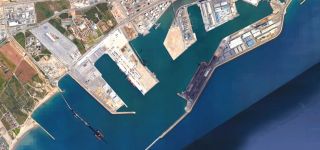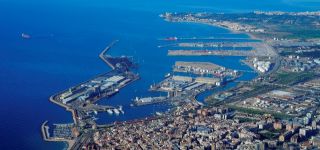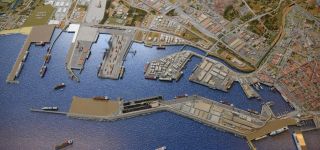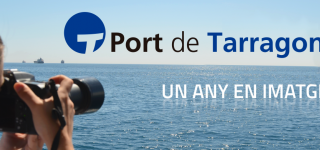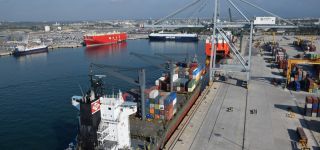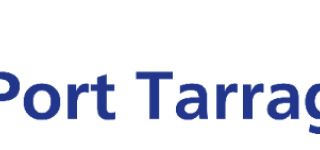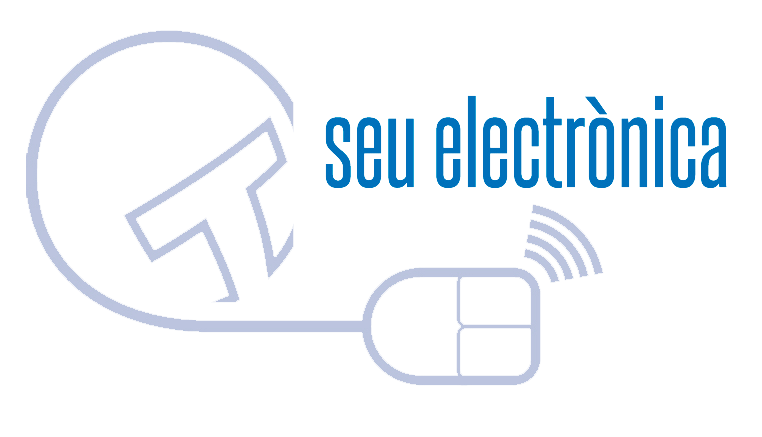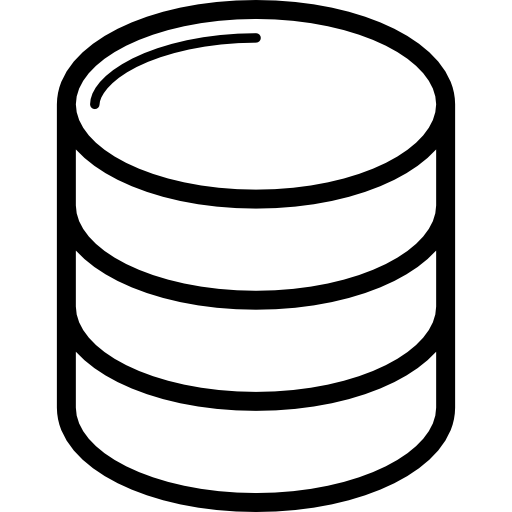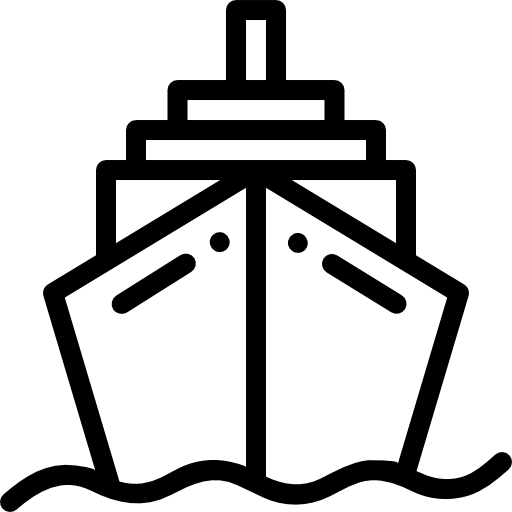Open Data
Your Access to Tarragona Port data

Here you will find public data held by the Port, with the aim of encouraging the utilization and re-utilization of this information.
This space aims to encourage openness and re- utilization of information generated by the Port, with the objective of achieving a more transparent, efficient and amenable administration, as well as creating new opportunities, both at a social and an economic level, by re-using information flexibly, with clarity, and thereby raise awareness of the importance of transparency.
The data are available in different formats, most of which are standard, enabling re-utilization, with the appropriate conditions relating to privacy, security and property, according to each circumstance.
More Information about Open Data
Who is it for?
DadesObertes.PortTarragona aims to:
Help businesses offer new products and useful services
Help in the creation of new applications to facilitate daily activity
Help researchers carry out studies and provide new knowledge
Help all persons looking for information about the Port
In compliance with Law 37/2007, of the 16th of November, on the re-utilization of public sector data, and Royal Decree 1496/2011, of the 24th of October, which develops the provisions in said Law, Tarragona Port Authority places an access platform to the availability of companies and citizens, providing information about the Port Authority’s daily activities.
How does it works?
Open Data is a global initiative which consists in allowing free access to everybody, without technical or legal limits, to data generated by public administrations. In the public sector, having access to public information guarantees transparency, efficiency and equal opportunities as well as creating value. Transparency is guaranteed because access is given to official sources; efficiency is guaranteed because citizens and organisations can create services which tie in better with public administration; equal opportunities are guaranteed because access is the same for every citizen. Value is created because new applications and services may be developed, using the information provided.
The licences and terms of use of the open data are submitted to the corresponding laws of data reuse in the public sector, and in some cases, may have intellectual property licences, although the tendency is to permit use without conditions, as long as the original contents are not manipulated, and the original source, in its most updated form, is cited.
Why give free access to the data?
With freedom to public information, there is the will to implement open government, based on the values of transparency, participation, service and efficiency. At the same time, value can be created by the reuse of public data, facilitating the internal cohesion of the public Administration systems, via the interconnectedness of services.
This website helps to guarantee the reuse of public data because it brings together all the open data initiatives of Tarragona Port Authority in a single catalogue together with associated information, when this is relevant to the possibility of reuse.
This represents a qualitative change given that, for the first time, a sizeable body of data is being opened in formats which are easy to reuse.
The continuing release of information in this website will be carried out giving priority to public service, guaranteeing the maximum quality of the data in both content and format, making them as intelligible as possible for the citizenry and using open source licencing where possible, permitting commercial reuse.
What is it possible to do with the data?
Open data allow consultation and the construction of applications, especially programs and viewing systems, that take the data as a source. Public administration itself may create applications, as may private individuals, organisations and businesses.
The type of applications that can be created with open data are very diverse and may respond to very different objectives. The uses may vary from citizens who use transport warnings on their mobiles, to associations of people with respiratory diseases who aim to monitor the levels of air pollution, through to companies that use GPS positioning of vehicles.
Other examples of the variety of applications that may be generated are maps and interactive graphics used in database journalism as well as in search engines. Information may also be used in blogs, websites, or mobile applications.
Formats with owners
DOC
(Microsoft Office Word)
Application distributed by Microsoft Office. Closed format for formatted texts, or without format. May contain text, images, graphs and links.
XLS
(Microsoft Office Word)
Format property of Microsoft Office. It contains rows and columns of cells where each cell may include data, which can be text, numbers, or formulas containing data. XLS sheets may also contain tables and graphs which show all sections, or a group of selected data.
Formats lliures
These are archive formats which can be created and manipulated for any programming system, free of legal restrictions.
PDF
( Portable Document Format)
Universal portable format which maintains the appearance of the document whichever operating system is employed(multiplatform). It includes any combination of text, multimedia and hypertext, and the content can be encoded and signed digitally. It is the ISO standard, as of 2008, for archives of electronic documents which have to be preserved for long durations. It may be created, seen, or modified with licence-free software
CSV
(Coma Separated Values)
Format de text obert per representar dades en format de taula, en columnes separades per comes (o punt i coma, on la coma és el separador decimal) i les files són salts de línia. Els camps que tenen una coma, un salt de línia o una cometa doble s’han de tancar entre cometes dobles. No indica un joc concret de caràcters, ni com van situats els bytes, ni el format per al salt de línia. Les extensions que s’utilitzen són .csv i .txt.
XML
(Extensible Mark-up Language)
Extensible labelling metalanguage developed by W3C, simple but strict. It has a fundamental role in the sharing of a great quantity of data. XML is a format which allows the interpretation of data in many different applications. It is the standard for the sharing of structured information between different platforms.
Compression Formats
ZIP

Compression format without data loss, which can be used on both owner and free formats. Archives have the termination .zip
History
Open Data is a global initiative created fundamentally in the USA and the UK from 2009 onwards. The first initiative with this philosophy is fruit of the United Nations (UNdata) , dating from the 12th of September 2006. A year later the District of Columbia (USA) would produce its Catalogue, published on the 23rd of October 2007. The third website of this type was the European Commission site SEMIC.EU Catalogue, published on the 17th of June 2008.
In 2009 there were similar initiatives in the USA, Sweden, Northern Ireland, Australia, the United Kingdom, New Zealand, Canada, Finland, as well as at the World Bank.
The first initiatives in the Spanish State were Open Data Euskadi and the Zaragoza Public Data Catalogue, both of which were published on the 8th of April 2010. The Catalonia Open Data Catalogue appeared on the 8th of November 2010. The following initiatives in Catalonia were Badalona Open Data , on the 11th of February 2011, and Lleida Open Data on the 14th of February 2011.
The Spanish State has created the Catálogo de Información Pública de la Administración General del Estado as the most visible element in the Project Aporta.
Other initiatives are:
{tab Port plan}
The Royal Decree 1495/2011, of the 24th of October, establishes for the State public sector the obligation that the General Administration of the State and the rest of the public sector must approve a plan for the re-use of public sector information, via electronic means, within the competencies enjoyed by the central State.
Consult the plan of this Port Authority for the reuse of public sector information (RISP).
The European Commission considers that public data must be reused, as much by citizens as by businesses, given that this helps transparency as well as constituting a source of dynamism for the information society, especially in the area of digital knowledge. The Directive 2003/98/CE, of the European Parliament and the European Council, has been assimilated into Spanish State legislation via the Law 37/2007, of the 16th of November.
The Directive, in broad terms, demands the following:
The reuse of public sector information, in equal conditions, with or without a commercial objective
Transparency in the conditions of reuse, detailed in a licence
That taxes and prices for the reuse of data will obey the general principle of cost recovery.
Documents and licences will be facilitated electronically
The Law 37/2007, of the 16th of November, on the reuse of public sector information, establishes the general framework for all public administrations.
It defines RISP and the concept of the document in the ambit of reuse
Excluded from the ambit of application are the following:
Administrative procedures in course
National defence
Areas outside of public service
Documents with intellectual or industrial property rights
Documents belonging to cultural, educative and research institutions
It establishes modalities for availability and the conditions to be met by licences
It prohibits exclusive agreements
It permits the charging of fees and public prices
It establishes the procedure of application , and the period within which the Administration must respond(20 days)
It establishes sanctions for infractions
The Royal Decree 1495/2011, of the 24th of October, develops the Law in the State public sector, recognising the importance and the value of the information generated by the public sector, because of the interest that citizens and businesses have in it. Openness can generate economic growth and the creation of jobs, as well as generating more transparency and democratic participation.
Authorises the general reuse of information, demanding a justification for exceptions
Obliges Administrations to communicate which information is available
Establishes the figure of RISP coordinator in public bodies
Establishes a State organism with the objective of assessing, promoting, raising awareness and enabling the continuing development of the Catalogue of Public Information
Obliges the Administrations to keep the Catalogue up-to-date
Conditions
The Port Authority of Tarragona favours the general modality of open data, without establishing specific conditions(article 8.1 of the Royal Decree 1495/2011, of the 24th of October), as shown in the terms laid out in the Legal Notice.
Legal Notice on the General Modality of Reusable Documents
Compulsory Nature of the General Conditions
These General Conditions, permanently available at www.datos.gob.es/avisolegal, are of application to any and all parties who reuse said documents.
Authorisation of Reuse and Non-Exclusive Concession of Intellectual Property Rights
These General Conditions permit the reuse of documents submitted to said Conditions, with commercial and non-commercial objectives. ‘Reuse’ means that of documents which are held by the organisms of the General Administration of the Spanish State and the other bodies of the State public sector mentioned in article 1.2 of the Royal Decree 1495/2011, of the 24th of October, which develops the Law 37/2007, of the 16th of November, on the reuse of State public sector information, by both physical and juridical persons, with commercial and non-commercial objectives, when in all cases this use is not an activity of public administration. Reuse includes copying, dissemination, modification, adaptation, extraction, reorganisation, and combination of the information cited.
The concept of document is established in paragraph 2 of article 3 of the Law 37/2007, of the 16th of November, on the reuse of public sector information, and includes all information in any support, as well as the graphic, sound, or visual expression thereof, thereby including data when in its least organised, or ‘raw’ form.
This authorisation includes the free, non-exclusive, concession of intellectual property rights pertaining to each document, authorising the reproduction, distribution, publishing or transformation, according to the needs of the activity authorised, in any modality or format, by anyone and enjoying the maximum period permitted by Law.
General conditions for Reuse
The general sense of the information must be retained.
The source must be cited. This may read as following: ‘Origin of data: Tarragona Port Authority’.
The last update of cited document must be included, provided this is shown in the original document.
The party reusing the document may not indicate, insinuate or suggest that Tarragona Port Authority, as holder of the information in question, participates, sponsors, or supports the reuse carried out.
The metadata on the update, and the conditions of reuse, must be conserved, without being altered or deleted.
Exemption from responsibility
The use of data will be carried by reusing parties or agents under their own responsibility, corresponding entirely to them. They and only they shall respond to third parties in the case of damages caused.
Tarragona Port Authority will not accept responsibility for the use made of said data by reusing parties or agents, nor will it accept responsibility for any damages caused or economic losses suffered, as a result of the reuse of data.
Tarragona Port Authority does not guarantee the continuity of the availability of documents reused, neither in content nor in form, and does not accept responsibility for any error or omission in them.
Responsibility of the party reusing data
The reusing party or agent is subject to the law on reuse of public sector information, in particular the system of sanctions provided in article 11 of the Law 37/2007, of the 16th of November, on reuse of public sector information.
Intellectual Property and Author’s Rights
In all cases, the acceptance of these Terms of Use does not suppose the concession of author’s rights nor intellectual property on groups of data.
Personal Data
Open data. PortTarragona does not show personal data, nor data which may identify specific individuals, as stipulated in the Organic Law 15/1999, of the 13th of December, on Personal Data Protection.
'Administración General del Estado' Transparency Portal
The compatibility authorisation or recognition resolutions that affect the Tarragona Port Authority personnel can be consulted via the following link to the Transparency Portal.
CATALOGUE OF DATA
Directory of Businesses

Contact information of different companies operating in the Port of Tarragona
Anual Reports

Every year we publish three anual reports about different, but related, topics of our port
Directory of Port Services Companies

Contact and registration of companies wich provides port services












